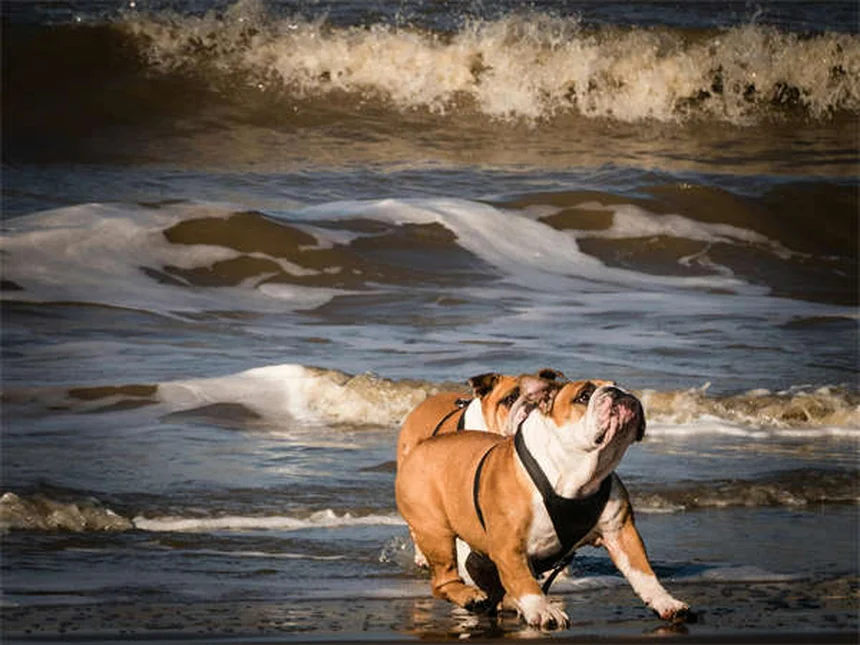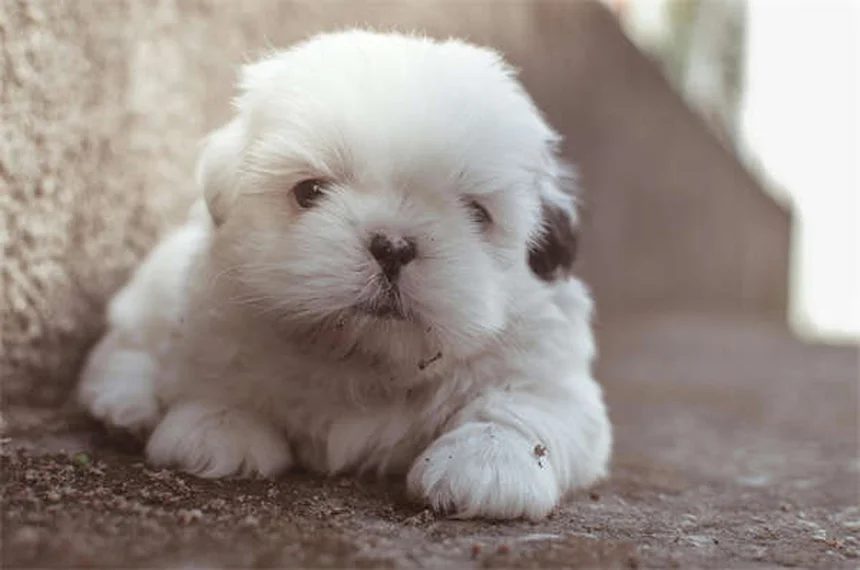How much do puppies sleep? The answer might surprise you - puppies sleep anywhere from 12 to 20 hours per day! That's right, your little furball spends most of their time snoozing. I remember when I first got my puppy, I was shocked by how much he slept - I actually worried something was wrong! But here's the deal: sleep is crucial for your puppy's growth and development.In this guide, we'll break down everything you need to know about puppy sleep patterns, including why they sleep so much and how to create the perfect bedtime routine. You'll learn why crate training works wonders, how to handle those middle-of-the-night potty breaks, and when you can finally expect to sleep through the night again. Trust me, as someone who's been through the puppy sleep deprivation phase, these tips will save your sanity!
E.g. :5 Best Home Remedies for Itchy Dogs (Vet-Approved Solutions)
- 1、Puppy Sleep 101: Understanding Their Natural Rhythms
- 2、Creating the Perfect Puppy Bedroom
- 3、The Puppy Bedtime Routine That Actually Works
- 4、Nighttime Puppy Emergencies: What to Do
- 5、Surviving the Puppy Sleep Phase
- 6、The Science Behind Puppy Sleep Patterns
- 7、Puppy Sleep vs. Human Sleep: Key Differences
- 8、Breed-Specific Sleep Quirks
- 9、Sleep Training Mistakes to Avoid
- 10、Fun Facts About Sleeping Puppies
- 11、FAQs
Puppy Sleep 101: Understanding Their Natural Rhythms
Why Puppies Sleep So Much
Did you know puppies are basically professional nappers? Depending on their breed, age, and daily activities, your furry friend might sleep anywhere from 12 to 20 hours each day! That's more than most teenagers I know.
Young puppies sleep almost constantly - unless they're eating. As they grow, you'll notice they switch between sleeping and sudden bursts of energy (usually at the most inconvenient times). Think of them like tiny, furry batteries that need frequent recharging.
The Puppy Sleep Cycle
Ever wonder why your puppy seems to have two settings: "completely zonked out" and "zoomies mode"? This is completely normal! Puppies don't sleep like we do - they take lots of short naps throughout the day and night.
Here's a quick comparison of sleep needs at different ages:
| Puppy Age | Daily Sleep Needs | Nighttime Potty Breaks |
|---|---|---|
| 8-12 weeks | 18-20 hours | Every 2-3 hours |
| 3-6 months | 16-18 hours | Every 3-4 hours |
| 6-12 months | 14-16 hours | 1-2 times per night |
Creating the Perfect Puppy Bedroom
 Photos provided by pixabay
Photos provided by pixabay
The Magic of Crate Training
I know what you're thinking: "Isn't putting my puppy in a crate like putting them in doggy jail?" Actually, when done right, crates become your puppy's favorite safe space - like their own personal bedroom!
A properly sized crate works wonders for sleep training. It gives your pup a designated spot to relax and helps with potty training too. The crate should be cozy enough that your puppy can stand up, turn around, and lie down comfortably - but not so big that they can use one end as a bathroom.
Setting Up the Ultimate Puppy Den
For the first few weeks, place the crate in your bedroom. Imagine being a tiny puppy in a strange new place - you'd want to know your human is nearby! Add these comfort items:
- A soft, washable bed with raised sides (like a puppy nest)
- A blanket that smells like you (an old t-shirt works great)
- A safe chew toy (nothing with small parts)
Pro tip: Avoid stuffing animals or toys with squeakers - these might make your puppy think it's playtime instead of bedtime!
The Puppy Bedtime Routine That Actually Works
Pre-Sleep Puppy Protocol
Creating a consistent bedtime routine is like giving your puppy a sleepy time roadmap. Here's what works best:
1. Dinner time: Feed your puppy their last meal at least 3 hours before bedtime. This gives them time to digest and do their business before lights out.
2. Final potty break: Take them out right before bed - this is non-negotiable!
3. Wind-down time: About an hour before bed, switch to calm activities. Gentle petting or quiet play helps them relax.
 Photos provided by pixabay
Photos provided by pixabay
The Magic of Crate Training
Here's a funny but true fact: Puppies are terrible at sleeping when you're awake. Once you tuck your pup in for the night, you need to actually go to sleep (or at least pretend really well).
If you stay up watching TV or moving around, your puppy will think it's party time. I learned this the hard way when my puppy thought 2 AM was the perfect time for fetch. Trust me - fake sleeping works better than coffee the next morning!
Nighttime Puppy Emergencies: What to Do
When Your Puppy Cries at Night
There are two main reasons puppies cry in their crates: potty emergency or loneliness. But how can you tell the difference?
If your puppy just went potty but is still crying, try quietly reassuring them with your voice or sitting nearby until they settle. The key is to not make it exciting - no playtime, no treats, no "aww poor baby" talk.
The Midnight Potty Run
Here's a question many new puppy parents ask: "How often will I need to get up at night?" The answer depends on your puppy's age.
Young puppies (8-12 weeks) typically need to go out every 2-3 hours. When you take them out, keep it boring - no playtime, just business. Use the same spot each time and give quiet praise when they go. Then straight back to bed!
Surviving the Puppy Sleep Phase
 Photos provided by pixabay
Photos provided by pixabay
The Magic of Crate Training
Let's be real - puppy parenthood is the world's most effective alarm clock. Those early weeks will test your ability to function on little sleep, but it does get better!
Most puppies can sleep through the night by 12-16 weeks. Until then, try these survival tips:
- Nap when your puppy naps (yes, even if it's 2 PM)
- Keep nighttime potty breaks short and boring
- Remember this phase is temporary!
Daytime Naps Matter Too
Puppies need daytime naps just as much as nighttime sleep. If your home is noisy during the day, create a quiet nap space. Some puppies even need you to stay nearby until they drift off - just like human babies.
The good news? With patience and consistency, your puppy will eventually sync up with your schedule. One day you'll wake up realizing you both slept through the night - and that's when you'll know all the hard work paid off!
Featured Image: iStock/SolStock
The Science Behind Puppy Sleep Patterns
How Puppy Brains Develop During Sleep
You might think your puppy is just snoozing away, but their brain is actually working overtime! REM sleep is when puppies process all the new information they've learned - which explains why they twitch and make little noises while sleeping. It's like their brain is replaying the day's adventures!
Did you know that puppies spend about 30% of their sleep time in REM, compared to only 20% for adult dogs? This intense brain activity helps them develop crucial skills and memories. That's why interrupting a puppy's sleep can be just as bad as skipping their training sessions - they need that downtime to grow smarter!
The Connection Between Sleep and Growth
Ever notice how your puppy seems bigger after a good nap? That's not just your imagination! Growth hormones are primarily released during deep sleep phases. Here's a fun fact: a sleeping puppy can grow up to 1% of their body weight overnight!
This explains why giant breed puppies need even more sleep than their smaller cousins. Their bodies are working double-time to grow those big bones and muscles. If you've got a future Clifford on your hands, don't be surprised if they spend 20 hours a day in dreamland!
Puppy Sleep vs. Human Sleep: Key Differences
Polyphasic vs. Monophasic Sleepers
While we humans typically sleep in one big chunk at night (monophasic), puppies are polyphasic sleepers - meaning they take multiple short naps throughout the day. This difference explains why your puppy can go from 100 to 0 in seconds, then wake up just as suddenly!
Here's a comparison of how our sleep cycles differ:
| Sleep Characteristic | Puppies | Humans |
|---|---|---|
| Daily Sleep Needs | 12-20 hours | 7-9 hours |
| Sleep Pattern | Multiple naps (polyphasic) | One long sleep (monophasic) |
| REM Sleep Percentage | 30% | 20-25% |
The Midnight Energy Surge Mystery
Why do puppies always get the zoomies right when you're ready for bed? This phenomenon actually has scientific roots! Puppies are crepuscular by nature - meaning they're most active at dawn and dusk. When we try to force our nocturnal schedules on them, their instincts kick in right when we're winding down.
The solution? Adjust playtimes to match their natural rhythms. A vigorous evening play session can help sync your schedules. Just don't be surprised if your puppy still thinks 5 AM is the perfect time for a game of fetch!
Breed-Specific Sleep Quirks
Working Breeds vs. Lap Dogs
Not all puppies sleep the same! Working breeds like Border Collies or German Shepherds tend to sleep less but more deeply, always ready to spring into action. Meanwhile, companion breeds like Cavalier King Charles Spaniels are professional snugglers who can nap anywhere, anytime.
I'll never forget my neighbor's Labrador puppy who could sleep through a marching band parade, while my Jack Russell would wake up if a leaf fell two blocks away. Knowing your puppy's breed tendencies helps set realistic expectations for their sleep habits.
The Toy Breed Sleep Advantage
Here's something you might not know: smaller breed puppies often adapt to human sleep schedules faster than larger breeds. Their tiny bladders might need more frequent potty breaks, but their sleep cycles align better with ours. That's why your Chihuahua puppy might be sleeping through the night while your friend's Great Dane pup is still waking them up at 3 AM!
Of course, every puppy is unique. The key is observing your pup's individual patterns rather than relying solely on breed stereotypes. After all, I've met some surprisingly lazy Border Collies and hyperactive Bulldogs!
Sleep Training Mistakes to Avoid
The Comfort Trap
When your puppy whines at night, your first instinct might be to comfort them - but this can backfire! Puppies are quick learners, and if they discover that crying brings attention (even negative attention), they'll keep doing it. Consistency is more important than comfort in the long run.
That said, there's a big difference between attention-seeking whines and genuine distress. The trick is learning to recognize your puppy's different vocalizations. A high-pitched, panicked cry usually means "I need to potty NOW," while a drawn-out whine often translates to "I want company."
The Daylight Savings Dilemma
Ever wonder why your puppy's internal clock seems unaffected by time changes? Unlike humans, puppies don't understand daylight savings time or schedule adjustments. If you suddenly change their routine, you might find yourself with a very confused (and vocal) alarm clock!
The solution? Make gradual adjustments over several days. Shift meal times and potty breaks by 15-minute increments until you're back on track. Your puppy will thank you - or at least stop barking at 4:30 AM!
Fun Facts About Sleeping Puppies
Dreaming in Doggy
Next time you see your puppy's paws twitching during sleep, you're witnessing doggy dreams in action! Research suggests puppies dream more frequently than adult dogs, likely because they're processing so many new experiences. What do they dream about? Probably chasing squirrels, playing with you, and that delicious treat they had earlier!
Here's a heartwarming thought: studies show that dogs often dream about their favorite humans. So when your puppy whimpers or wags their tail in sleep, they might be dreaming of you!
The Temperature Sweet Spot
Puppies are terrible at regulating their body temperature, which affects their sleep quality. The ideal sleeping environment is between 65-75°F (18-24°C) - warm enough to be cozy but cool enough to prevent overheating. This explains why your puppy might dig at their bed before lying down - they're trying to create the perfect temperature nest!
In winter, consider a heated pad (set on low) or extra blankets. In summer, a cooling mat can work wonders. Just make sure any temperature-control products are puppy-proof and supervised at first!
E.g. :How to Get Your Puppy on a Healthy Sleeping Schedule | PetMD
FAQs
Q: Why does my puppy sleep so much during the day?
A: Puppies sleep so much because they're growing at an incredible rate - both physically and mentally! Think of them like human babies who need frequent naps to support their development. All that playtime and exploration wears them out quickly. Newborn puppies might sleep up to 20 hours a day, while older puppies (3-6 months) still need about 16-18 hours. The sleep helps their bodies grow, their brains process new information, and their energy stores recharge. Don't worry if your pup seems to alternate between crazy zoomies and deep sleep - this is completely normal puppy behavior!
Q: How can I get my puppy to sleep through the night?
A: Getting your puppy to sleep through the night takes time and consistency. First, establish a solid bedtime routine - feed dinner 3 hours before bed, take a final potty break, and wind down with calm activities. Crate training helps tremendously, as puppies naturally avoid soiling their sleeping area. For young puppies (8-12 weeks), expect to wake up every 2-3 hours for potty breaks. The good news? Most puppies can sleep 6-8 hours by 12-16 weeks old. I found that using a snuggle puppy (a stuffed animal with a heartbeat) helped my pup feel less alone at night.
Q: Is it normal for my puppy to cry in their crate at night?
A: Some crying is normal, especially during the first few nights in a new home. Your puppy is adjusting to being away from their littermates and mother. There are two main reasons for crying: they need to potty or they want comfort. If it's been a few hours since their last potty break, take them out quietly (no playtime!). If they've recently gone, try sitting quietly by the crate until they settle. Never punish crying, but don't reward it with attention either - this teaches them that crying gets results. With consistency, most puppies adjust within a week.
Q: What's the best sleeping arrangement for a new puppy?
A: The best setup is a properly sized crate in your bedroom for the first few weeks. The crate should be just big enough for your puppy to stand, turn around, and lie down comfortably. Add soft bedding (washable is best!), a blanket with your scent, and maybe a safe chew toy. Having the crate in your room helps your puppy feel secure while preventing middle-of-the-night accidents around the house. As your pup gets older and more reliable with potty training, you can gradually move the crate further away if desired.
Q: How often will I need to take my puppy out at night?
A: The frequency depends on your puppy's age. Here's a quick guide: 8-12 week old puppies typically need to go every 2-3 hours, 3-6 month olds can often make it 3-4 hours, and by 6 months, many can sleep 6-8 hours. The general rule is that puppies can hold their bladder about one hour for every month of age. So a 2-month-old puppy needs to go every 2 hours. Pro tip: Set alarms rather than waiting for your puppy to cry - this helps prevent accidents and teaches them to sleep instead of signaling to go out.







